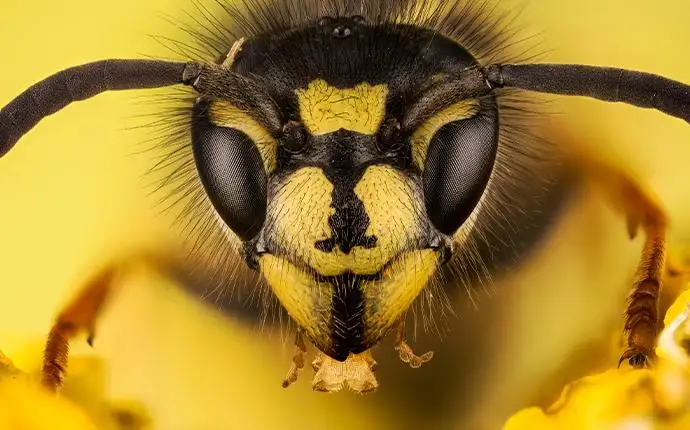Stinging Insects
(Vespa)
What are stinging insects?
Identified by a stinger extending from their hind end, stinging insects are pests that people have a “love-hate” relationship with. We love them because they help to pollinate plants and control populations of nuisance insects. But, we hate that they sometimes build their nests in less than ideal places, putting ourselves, kids, and pets in danger. Some common species of stinging insects that live throughout our area of North Carolina are yellow jackets, bald-faced hornets, and paper wasps.
Yellow Jackets
Yellow jackets have a segmented body with a distinctive, thin waist. Their smooth body has a defined yellow and black striped pattern, and their long wings fold against their bodies when at rest.
Bald-Faced Hornets
Bald-faced hornets are related to the yellow jacket. They are black and white. Their bodies are black, and their faces are mainly white. They are a large hornet.
Paper Wasps
Paper wasps have upside-down, umbrella-shaped nests made from a paper-like material. Paper wasps have a pinched waist, and their bodies are black or brown with yellow, red, or orange markings.
Are stinging insects dangerous?
Yes, stinging insects are dangerous. Many species are aggressive and territorial and work together to protect their nest. They won’t hesitate to sting, and the smooth stingers that yellow jackets, wasps, and hornets possess allow them to sting their target repeatedly. The venom that stinging insects have is strong enough to trigger reactions in people. Allergic reactions to stinging insect venom can range from mild (swelling at the sting site) to severe (anaphylaxis).
Why do I have a stinging insect problem?
Overwintering queens emerge from their hiding spots in the spring to build a nest and a colony that grows throughout the spring, summer, and fall months. Stinging insects will become a problem on any property that provides them with a suitable nesting spot, access to water, and plenty of food to gather and feed their growing colony with. Most of our yards offer a place for stinging insects to build a nest and forage for food. You can read more in this blog: “Why Do Wasps Appear In The House During The Winter?“.
Where will I find stinging insects?
Stinging insects build their nests in the ground, on the ground, or above the ground, depending on their species. Yellow jackets are ground-nesters and place their nests under shrubs, woodpiles, rocks, or inside ground holes or the abandoned nests of small animals. Paper wasps and bald-faced hornets place their nests in similar areas up off the ground in the branches of trees, in shrubs, in door frames, and under roof eaves.
How do I get rid of stinging insects?
Win the war against stinging insects and other pests with the help of an experienced professional. At Innovative Pest Solutions, we can provide fast and effective services that that homeowners in the Raleigh, NC area can trust. We get rid of pests and stop them from coming back! You can also check out this blog for more information: “The Safest Way To Get Rid Of Yellow Jackets On Your Raleigh, NC Property“.
Protecting our customer’s home, health, and the environment are our top priorities. To learn more about our locally owned and operated company and our affordable pest solutions, reach out today! We will be happy to provide you with information about our home pest control options.
How can I prevent stinging insects in the future?
To prevent stinging insects from becoming a problem on your Raleigh, North Carolina property, partner with Innovative Pest Solutions. Also, implement the following tips to guard your home against stinging insects:
- Don’t plant lots of flowering vegetation next to your home’s exterior walls.
- Cut tree branches back away from your roof or exterior walls.
- Repairing holes in exterior walls, foundation, and gaps around windows and doors will help stop stinging insects from wandering into your house.
- When eating outside, keep serving dishes covered and immediately clean up after eating.
- Keep lids on trash cans and recycling bins to keep from attracting foraging stinging insects to your property.
- Eliminate nesting areas by remove woodpiles, brush piles, overgrown vegetation, and fill-in ground holes.
You can also check out this blog for more information on preventing stinging insects: “The Easy Way To Keep Wasps Out Of Your Raleigh Yard“.
Helpful Stinging Insect Articles





